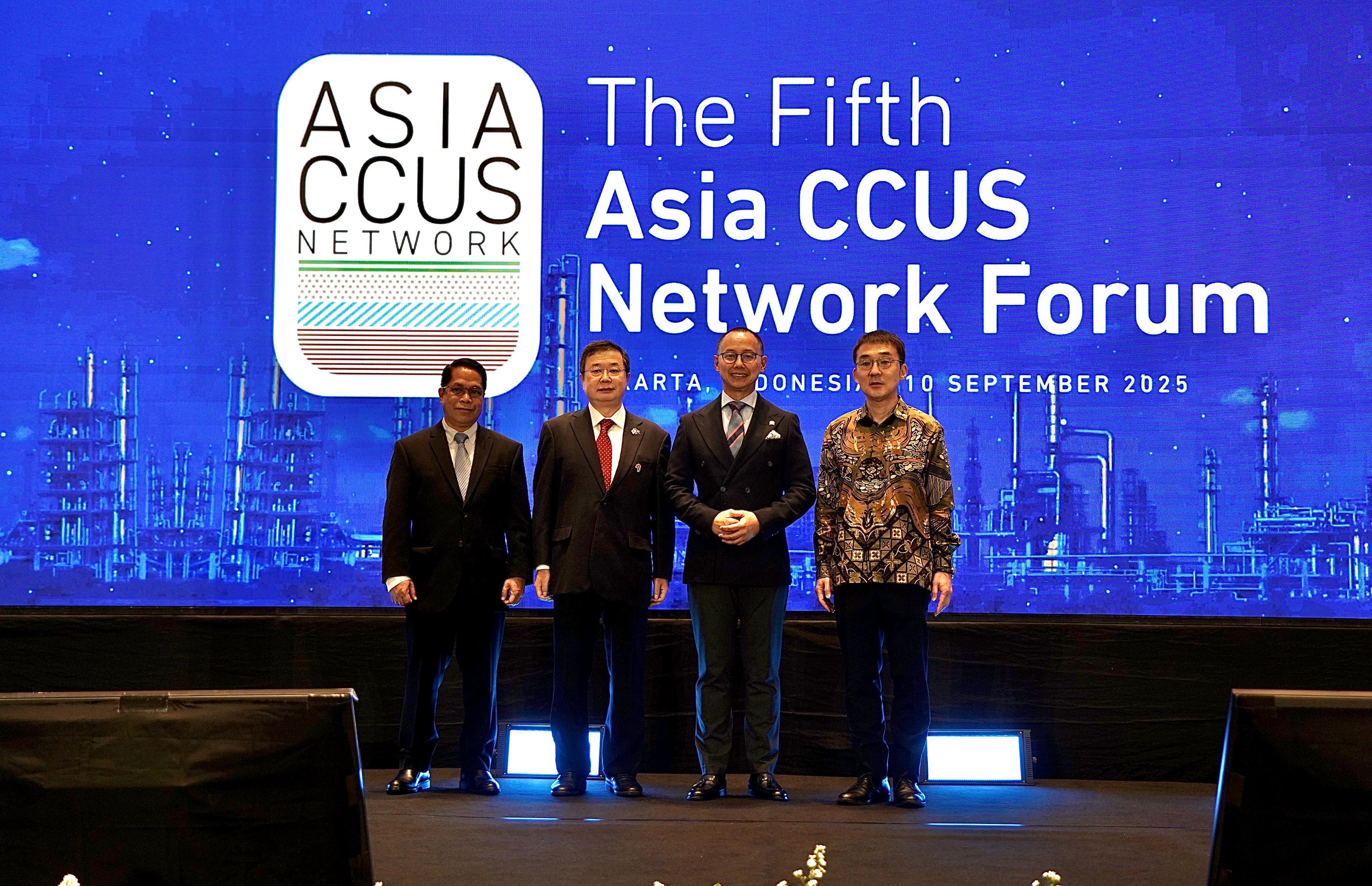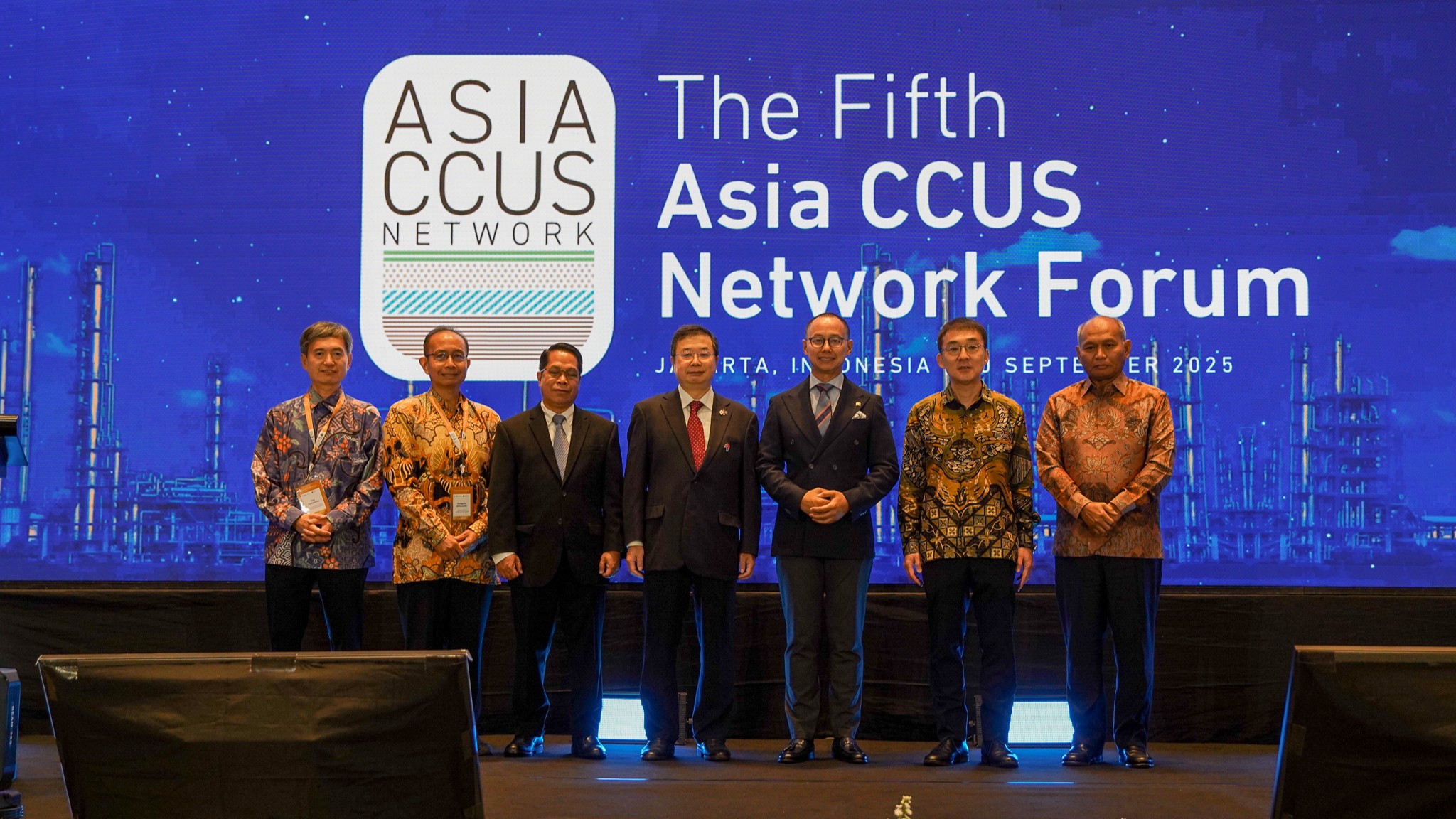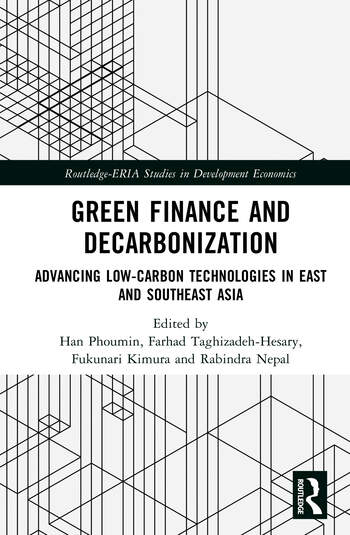The 5th Asia CCUS Network Forum
Date:
16 September 2025Category:
Press ReleasesTopics:
EnergyShare Article:
Print Article:
The 5th Asia CCUS Network Forum was convened at the Fairmont Hotel Ballroom, Jakarta, on 10–11 September 2025. The Forum was co-hosted by the Economic Research Institute for ASEAN and East Asia (ERIA), as Secretariat of the Asia CCUS Network (ACN), the Ministry of Economy, Trade and Industry (METI) of Japan, the Ministry of Energy and Mineral Resources (MEMR) of Indonesia, SKK Migas Indonesia, and the Indonesia Centre of Excellence for CCS and CCUS.
Opening Addresses
Opening remarks were delivered in person by Mr Tetsuya Watanabe, President of ERIA; Mr Kazuo Chujo, Minister/Deputy Head of the Mission of Japan to ASEAN; Mr Laode Sulaeman, Director General of Oil and Gas, MEMR, Indonesia; and Mr Eddy Soeparno, Deputy Chairman of the People’s Consultative Assembly, Indonesia. Video addresses were presented by H.E. Yoji Muto, Minister of Economy, Trade and Industry, Japan, and H.E. Malaithong Kommasith, Minister of Industry and Commerce, Lao PDR. The event gathered 110 participants onsite and more than 200 online from across the Asia-Pacific region and beyond.
Keynote Speeches
Keynote remarks were delivered in person by Dr Djoko Siswanto, Head of SKK Migas, Indonesia; Professor Sanggono Adisasmito, Head of the Indonesia Centre of Excellence for CCS and CCUS; and Dr Koji Yamamoto, Senior Councilor and Chief Technology Officer of the Japan Organization of Metals and Energy Security (JOGMEC). Video addresses were delivered by Ms Mary Burce Warlick, Deputy Executive Director of the International Energy Agency (IEA), and Mr Jarad Daniels, Chief Executive Officer of the Global CCS Institute (GCCSI).
Forum Objectives and Focus
The Asia CCUS Network Forum is an annual platform for governments, industry, academia, and financial institutions to exchange insights, advance CCS/CCUS technologies, and promote their commercialisation in pursuit of net zero emissions.
The 5th Forum focused on cross-border CCS, addressing opportunities for international collaboration, policy and commercial frameworks, and technological innovation. Five sessions were held covering:
- Policy considerations for cross-border CCS in the Asia-Pacific region
- Commercial considerations for cross-border CCS in the Asia-Pacific region
- CO₂ shipping for cross-border CCS
- Expansion of CCS/CCU and carbon recycling
- Recent CCUS studies, policy, regulatory, and financing developments
Key Outcomes from the Panel Sessions
- Session 1underscored the importance of multilateral cooperation amongst CO₂ exporting and storage countries. Participants highlighted the need for urgent pilot projects, mechanisms to reduce costs, and frameworks to ensure safe and secure long-term storage.
- Session 2focused on the private sector’s role, stressing the need for multi-source, multi-sink CO₂ supply chains, information sharing, equipment standardisation, and strong public–private partnerships.
- Session 3addressed CO₂ shipping technologies, noting the benefits of shared facilities, common specifications, and innovations such as low-temperature/low-pressure shipping for long-distance transport. Lessons from LNG projects were cited as valuable references.
- Session 4showcased cutting-edge CCUS technologies and carbon recycling initiatives, including the Carbon Management Challenge (CMC), CO₂ separation and recovery, concrete manufacturing using CO₂, and regulatory frameworks for pipeline transport.
- The Final Sessiongathered the ACN Advisory Group. Members shared updates on domestic policies and project implementation, including regulatory progress and integration of cross-border CCS into national strategies. The Q&A session raised issues of policy development and public acceptance. Participants stressed the importance of accurate communication of technical information, economic benefits for local communities (jobs and investment), and financial incentives through carbon pricing and green taxonomies.
Progress in Member Countries
- Indonesiahas established CCS/CCUS regulations for petroleum and non-petroleum acreage, conducted CO₂ storage studies in saline aquifers, and initiated a carbon tax.
- Malaysiais assessing the feasibility of cross-border CO₂ transportation.
- Thailandis advancing five pilot projects and assessing five candidate storage sites.
- Philippinesis reviewing legal and regulatory frameworks, guided by the Asian Development Bank, and engaging the oil and gas industry in CCUS development.
- Australiahas a robust regulatory framework with two commercial-scale CCS projects and 17 offshore greenhouse gas storage permits, and is pursuing bilateral arrangements to enable transboundary CCS projects.
Way Forward
The Forum reaffirmed ACN’s commitment to supporting its members through:
- Knowledge sharing on legal and regulatory frameworks
- Assessments of CO₂ storage potential
- Strengthening CO₂ value chain networks between emitting and storage countries
- Developing financing mechanisms, including carbon pricing and credit systems
Participants agreed that ongoing dialogue through platforms like the Asia CCUS Network will be key to accelerating CCS/CCUS deployment in the Asia-Pacific and achieving long-term climate goals.







